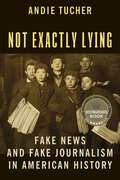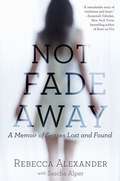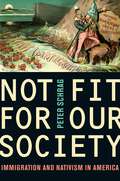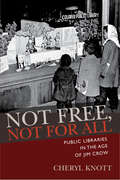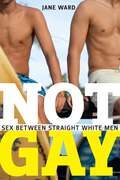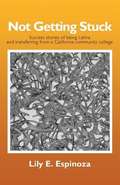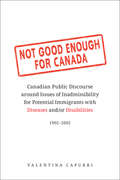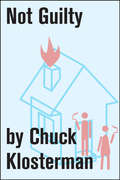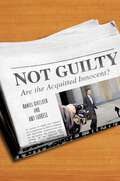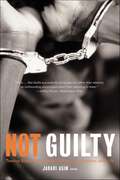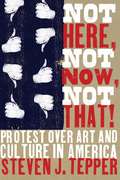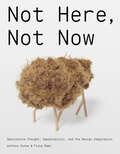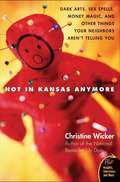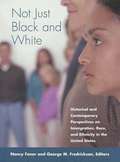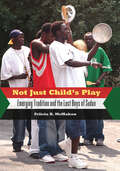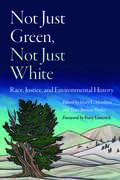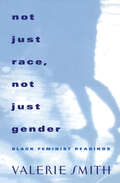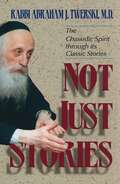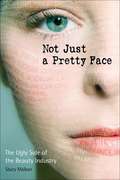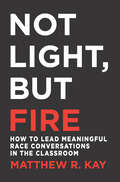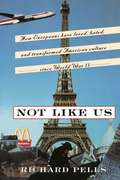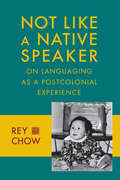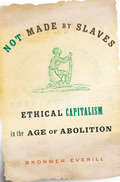- Table View
- List View
Not Exactly Lying: Fake News and Fake Journalism in American History
by Andie TucherLong before the current preoccupation with “fake news,” American newspapers routinely ran stories that were not quite, strictly speaking, true. Today, a firm boundary between fact and fakery is a hallmark of journalistic practice, yet for many readers and publishers across more than three centuries, this distinction has seemed slippery or even irrelevant. From fibs about royal incest in America’s first newspaper to social-media-driven conspiracy theories surrounding Barack Obama’s birthplace, Andie Tucher explores how American audiences have argued over what’s real and what’s not—and why that matters for democracy.Early American journalism was characterized by a hodgepodge of straightforward reporting, partisan broadsides, humbug, tall tales, and embellishment. Around the start of the twentieth century, journalists who were determined to improve the reputation of their craft established professional norms and the goal of objectivity. However, Tucher argues, the creation of outward forms of factuality unleashed new opportunities for falsehood: News doesn’t have to be true as long as it looks true. Propaganda, disinformation, and advocacy—whether in print, on the radio, on television, or online—could be crafted to resemble the real thing. Dressed up in legitimate journalistic conventions, this “fake journalism” became inextricably bound up with right-wing politics, to the point where it has become an essential driver of political polarization. Shedding light on the long history of today’s disputes over disinformation, Not Exactly Lying is a timely consideration of what happens to public life when news is not exactly true.
Not Fade Away
by Rebecca Alexander Sascha Alper<P>Even a darkening world can be brilliantly lit from within. <P>Born with a rare genetic mutation called Usher Syndrome type III, Rebecca Alexander has been simultaneously losing both her sight and hearing since she was a child, and was told that she would likely be completely blind and deaf by age 30. Then, at 18, a fall from a window left her athletic body completely shattered. <P>None of us know what we would do in the face of such devastation. What Rebecca did was rise to every challenge she faced. She was losing her vision and hearing and her body was broken, but she refused to lose her drive, her zest for life and - maybe most importantly - her sense of humor. Now, at 35, with only a sliver of sight and significantly deteriorated hearing, she is a psychotherapist with two masters' degrees from Columbia University, and an athlete who teaches spin classes and regularly competes in extreme endurance races. She greets every day as if it were a gift, with boundless energy, innate curiosity, and a strength of spirit that have led her to places we can't imagine. <P>In Not Fade Away, Rebecca tells her extraordinary story, by turns harrowing, funny and inspiring. She meditates on what she's lost--from the sound of a whisper to seeing a sky full of stars, and what she's found in return--an exquisite sense of intimacy with those she is closest to, a love of silence, a profound gratitude for everything she still has, and a joy in simple pleasures that most of us forget to notice. <P>Not Fade Away is both a memoir of the senses and a unique look at the obstacles we all face--physical, psychological, and philosophical--exploring the extraordinary powers of memory, love, and perseverance. It is a gripping story, an offering of hope and motivation, and an exquisite reminder to live each day to its fullest.
Not Fit for Our Society: Immigration and Nativism in America
by Peter SchragIn a book of deep and telling ironies, Peter Schrag provides essential background for understanding the fractious debate over immigration. Covering the earliest days of the Republic to current events, Schrag sets the modern immigration controversy within the context of three centuries of debate over the same questions about who exactly is fit for citizenship. He finds that nativism has long colored our national history, and that the fear—and loathing—of newcomers has provided one of the faultlines of American cultural and political life. Schrag describes the eerie similarities between the race-based arguments for restricting Irish, German, Slav, Italian, Jewish, and Chinese immigrants in the past and the arguments for restricting Latinos and others today. He links the terrible history of eugenic "science" to ideas, individuals, and groups now at the forefront of the fight against rational immigration policies. Not Fit for Our Society makes a powerful case for understanding the complex, often paradoxical history of immigration restriction as we work through the issues that inform, and often distort, the debate over who can become a citizen, who decides, and on what basis.
Not Free, Not for All: Public Libraries in the Age of Jim Crow (Studies In Print Culture And The History Of The Book Ser.)
by Cheryl Knott“An illuminating account of the development and demise of separate public libraries for African Americans in the South during the era of segregation.” —The Journal of American CultureWinner of the Eliza Atkins Gleason Book Award and the Lillian Smith Book AwardAmericans tend to imagine their public libraries as time-honored advocates of equitable access to information for all. Through much of the twentieth century, however, many black Americans were denied access to public libraries or allowed admittance only to separate and smaller buildings and collections. While scholars have examined and continue to uncover the history of school segregation, there has been much less research published on the segregation of public libraries in the Jim Crow South. In fact, much of the writing on public library history has failed to note these racial exclusions.In Not Free, Not for All, Cheryl Knott traces the establishment, growth, and eventual demise of separate public libraries for African Americans in the South, disrupting the popular image of the American public library as historically welcoming readers from all walks of life. Using institutional records, contemporaneous newspaper and magazine articles, and other primary sources together with scholarly work in the fields of print culture and civil rights history, Knott reconstructs a complex story involving both animosity and cooperation among whites and blacks who valued what libraries had to offer. African American library advocates, staff, and users emerge as the creators of their own separate collections and services with both symbolic and material importance, even as they worked toward dismantling those very institutions during the era of desegregation.
Not Gay: Sex between Straight White Men (Sexual Cultures #19)
by Jane WardA different look at heterosexuality in the twenty-first centuryA straight white girl can kiss a girl, like it, and still call herself straight—her boyfriend may even encourage her. But can straight white guys experience the same easy sexual fluidity, or would kissing a guy just mean that they are really gay? Not Gay thrusts deep into a world where straight guy-on-guy action is not a myth but a reality: there’s fraternity and military hazing rituals, where new recruits are made to grab each other’s penises and stick fingers up their fellow members’ anuses; online personal ads, where straight men seek other straight men to masturbate with; and, last but not least, the long and clandestine history of straight men frequenting public restrooms for sexual encounters with other men. For Jane Ward, these sexual practices reveal a unique social space where straight white men can—and do—have sex with other straight white men; in fact, she argues, to do so reaffirms rather than challenges their gender and racial identity. Ward illustrates that sex between straight white men allows them to leverage whiteness and masculinity to authenticate their heterosexuality in the context of sex with men. By understanding their same-sex sexual practice as meaningless, accidental, or even necessary, straight white men can perform homosexual contact in heterosexual ways. These sex acts are not slippages into a queer way of being or expressions of a desired but unarticulated gay identity. Instead, Ward argues, they reveal the fluidity and complexity that characterizes all human sexual desire. In the end, Ward’s analysis offers a new way to think about heterosexuality—not as the opposite or absence of homosexuality, but as its own unique mode of engaging in homosexual sex, a mode characterized by pretense, dis-identification and racial and heterosexual privilege. Daring, insightful, and brimming with wit, Not Gay is a fascinating new take on the complexities of heterosexuality in the modern era.
Not Getting Stuck: Success Stories Of Being Latina And Transferring From A California Community College
by Lily E. Espinoza"Not Getting Stuck," by Lily E. Espinoza, is the first book on college success from the Latina point-of-view. Showcased are voices of Latina students in the transfer process from community college to the university. These are new, fresh, never-before-told stories that allow the reader to experience the heart-pounding adventure of the college admissions
Not Good Enough for Canada: Canadian Public Discourse around Issues of Inadmissibility for Potential Immigrants with Diseases and/or Disabilities, 1902–2002
by Valentina CapurriNot Good Enough for Canada investigates the development of Canadian immigration policy with respect to persons with a disease or disability throughout the twentieth century. With an emphasis on social history, this book examines the way the state operates through legislation to achieve its goals of self-preservation even when such legislation contradicts state commitments to equality rights. Looking at the ways federal politicians, mainstream media, and the judicial system have perceived persons with disabilities, specifically immigrant applicants with disabilities, this book reveals how Canadian immigration policy has systematically omitted any reference to this group, rendering them socially invisible.
Not Guilty
by Chuck KlostermanOriginally collected in Chuck Klosterman IV and now available both as a stand-alone essay and in the ebook collection Chuck Klosterman on Living and Society, this essay is about guilty pleasures.
Not Guilty: Are the Acquitted Innocent?
by Daniel Givelber Amy FarrellAs scores of death row inmates are exonerated by DNA evidence and innocence commissions are set up across the country, conviction of the innocent has become a well-recognized problem. But our justice system makes both kinds of errors—we acquit the guilty and convict the innocent—and exploring the reasons why people are acquitted can help us to evaluate the efficiency and fairness of our criminal justice system. Not Guilty provides a sustained examination and analysis of the factors that lead juries to find defendants “not guilty,” as well as the connection between those factors and the possibility of factual innocence, examining why some criminal trials result in not guilty verdicts and what those verdicts suggest about the accuracy of our criminal process.
Not Guilty: Twelve Black Men Speak Out on Law, Justice, and Life
by Jabari AsimPatrick Dorismond, Abner Louima, and Amadou Diallo -- hear what a jury of prominent African Americans has to say about the black man's struggle for justice in AmericaPrompted by the killing of Amadou Diallo and the acquittal of the four New York City police officers who mistook him for an armed criminal, this collection of essays by prominent black male writers offers twelve unique and startling perspectives on what it's like for a black man living in an inherently racist society.Coming from a broad spectrum of economic and social backgrounds, the poets, journalists, lawyers, writers, and academics that make up this jury write forcefully and eloquently about growing up and raising sons, identifying with others and yearning to be set apart, attempting reasonable discourse, and succumbing to unspeakable anger. Together these essays deconstruct the monolithic myths that shroud our nation's black men and offer small rays of hope that on the streets, at school and work, and in the courtroom justice will be served.
Not Here, Not Now, Not That!: Protest over Art and Culture in America
by Steven J. TepperIn the late 1990s Angels in America,Tony Kushner’s epic play about homosexuality and AIDS in the Reagan era, toured the country, inspiring protests in a handful of cities while others received it warmly. Why do people fight over some works of art but not others? Not Here, Not Now, Not That! examines a wide range of controversies over films, books, paintings, sculptures, clothing, music, and television in dozens of cities across the country to find out what turns personal offense into public protest. What Steven J. Tepper discovers is that these protests are always deeply rooted in local concerns. Furthermore, they are essential to the process of working out our differences in a civil society. To explore the local nature of public protests in detail, Tepper analyzes cases in seventy-one cities, including an in-depth look at Atlanta in the late 1990s, finding that debates there over memorials, public artworks, books, and parades served as a way for Atlantans to develop a vision of the future at a time of rapid growth and change. Eschewing simplistic narratives that reduce public protests to political maneuvering, Not Here, Not Now, Not That! at last provides the social context necessary to fully understand this fascinating phenomenon.
Not Here, Not Now: Speculative Thought, Impossibility, and the Design Imagination
by Anthony Dunne Fiona RabyWhat it means to design at a time when, for many people, the future seems to have become an impossibility.When reality fails us, what can designers do? Question design&’s relationship to reality, as Anthony Dunne and Fiona Raby do, in this exhilarating, yet thoughtful, journey to the edges of science, philosophy, and literature to find new ways of thinking about the possible—and about the meaning, function, and place of design in that speculative world of &“not here, not now.&” A conceptual travelogue of sorts, Not Here, Not Now brings together words, images, and objects that capture, in design form, some of the ideas encountered along the way. Itself a design experiment, the richly illustrated book explores ways to bring these ideas into conversation with objects through imagined archives, libraries, glossaries, taxonomies, lists, tales, and essays.The design responses in Not Here, Not Now—to a stone raft, for example, or a vegetable lamb, swatches of imaginary colors, a pocket universe in the home, objects undergoing space-time collapse—are, like the most compelling utopias, impossible by design, aiming instead to nourish the creative, intellectual, and imaginative ground from which new possibilities, still unknown, might begin to emerge.
Not In Kansas Anymore
by Christine WickerMagic has stepped out of the movies, morphed from the pages of fairy tales, and is more present in America today than you might expect. Soccer moms get voodoo head washings in their backyards, young American soldiers send chants toward pagan gods of war, and a seemingly normal family determines that they are in fact elves. National bestselling author and award-winning religion reporter Christine Wicker leaves no talisman unturned in her hunt to find what's authentic and what's not in America's burgeoning magical reality. From the voodoo temples of New Orleans to the witches' covens of Salem to a graveyard in north Florida, Wicker probes the secrets of an underground society and teaches lessons she never dreamed could be taught. What she learns repels her, challenges her, and changes her in ways she never could have imagined. And if you let it, it might change you, too.
Not Just Black and White: Historical and Contemporary Perspectives on Immgiration, Race, and Ethnicity in the United States
by Nancy Foner George M. FredricksonImmigration is one of the driving forces behind social change in the United States, continually reshaping the way Americans think about race and ethnicity. How have various racial and ethnic groups—including immigrants from around the globe, indigenous racial minorities, and African Americans—related to each other both historically and today? How have these groups been formed and transformed in the context of the continuous influx of new arrivals to this country? In Not Just Black and White, editors Nancy Foner and George M. Fredrickson bring together a distinguished group of social scientists and historians to consider the relationship between immigration and the ways in which concepts of race and ethnicity have evolved in the United States from the end of the nineteenth century to the present. Not Just Black and White opens with an examination of historical and theoretical perspectives on race and ethnicity. The late John Higham, in the last scholarly contribution of his distinguished career, defines ethnicity broadly as a sense of community based on shared historical memories, using this concept to shed new light on the main contours of American history. The volume also considers the shifting role of state policy with regard to the construction of race and ethnicity. Former U.S. census director Kenneth Prewitt provides a definitive account of how racial and ethnic classifications in the census developed over time and how they operate today. Other contributors address the concept of panethnicity in relation to whites, Latinos, and Asian Americans, and explore socioeconomic trends that have affected, and continue to affect, the development of ethno-racial identities and relations. Joel Perlmann and Mary Waters offer a revealing comparison of patterns of intermarriage among ethnic groups in the early twentieth century and those today. The book concludes with a look at the nature of intergroup relations, both past and present, with special emphasis on how America’s principal non-immigrant minority—African Americans—fits into this mosaic. With its attention to contemporary and historical scholarship, Not Just Black and White provides a wealth of new insights about immigration, race, and ethnicity that are fundamental to our understanding of how American society has developed thus far, and what it may look like in the future.
Not Just Child's Play: Emerging Tradition and the Lost Boys of Sudan
by Felicia R. McMahonWinner of the 2008 Chicago Folklore PrizeFelicia R. McMahon breaks new ground in the presentation and analysis of emerging traditions of the “Lost Boys,” a group of parentless youths who fled Sudan under tragic circumstances in the 1990s. With compelling insight, McMahon analyzes the oral traditions of the DiDinga Lost Boys, about whom very little is known. Her vibrant ethnography provides intriguing details about the performances and conversations of the young DiDinga in Syracuse, New York. It also offers important insights to scholars and others who work with refugee groups. The author argues that the playful traditions she describes constitute a strategy by which these young men proudly position themselves as preservers of DiDinga culture and as harbingers of social change rather than as victims of war. Drawing ideas from folklore, linguistics, drama, and play theory, the author documents the danced songs of this unique group. Her inclusion of original song lyrics translated by the singers and descriptions of conversations convey the voices of the young men. Well researched and carefully developed, this book makes an original contribution to our understanding of refugee populations and tells a compelling story at the same time.
Not Just Green, Not Just White: Race, Justice, and Environmental History
by Traci Brynne Voyles Mary E. MendozaNot Just Green, Not Just White brings together a group of diverse contributors to explore the rich intersections between race and environment. Together these contributors demonstrate that the field of environmental history, with its core questions and critical engagement with the nonhuman world, provides a fertile context for understanding racism and ongoing colonialism as power structures in the United States. Earlier historiography has defined environmental history as the study of the changing relationships between humans and the environment—or nature. This volume aims to redefine the field, arguing that neither humans nor environment is a monolithic actor in any given story. Both humans and the environment are diverse, and often the environment causes conflict between and among peoples, leaving unequal access and power in its wake. Just as important, these histories often reveal how, despite unequal power, those who carry less privilege still persist. Together these essays demonstrate the promise of the field of environmental history and reveal how, when practitioners in the field decide to move away from &“green&” and &“white&” topics, they will be able to explain much more about our collective past than anyone ever imagined.
Not Just Race, Not Just Gender: Black Feminist Readings
by Valerie SmithFrom the nineteenth century articulations of Sojourner Truth to contemporary thinkers like Patricia J. Williams, Black feminists have always recognized the mutual dependence of race and gender. Detailing these connections, Not Just Race, Not Just Gender explores the myriad ways race and gender shape lives and social practices. Resisting essentialist tendencies, Valerie Smith identifies black feminist theorizing as a strategy of reading rather than located in a particular subjective experience. Her intent is not to deny the validity of black women's lived experience, but rather to resist deploying a uniform model of black women's lives that actually undermines the power of black feminist thought. Whether reading race or gender in the Central Park jogger case or in contemporary media, like Livin' Large, Smith displays critical rigor that promises to change the way we think about race and gender.
Not Just Stories
by Tweski ShaarThe great chassidic stories are the best entry into the movement's rich spiritual, moral, and intellectual core. Chassidism's greatest thinkers have used its tales to captivate their listeners and then introduce them to the thought-world of the Baal Shem Tov and his spiritual heirs. In this time-honored craft, Rabbi Twerski has few peers. In his hands, stories are not just stories they are precision tools that teach and enlighten, that heal and encourage. <p><p>Not Just Stories is a milestone book. You will read it over and over again for the stimulation of its message and the sheer joy of its text!
Not Just a Pretty Face: The Ugly Side of the Beauty Industry
by Stacy MalkanLead in lipstick? 1,4 dioxane in baby soap? Coal tar in shampoo? How is this possible? Simple. The $35 billion cosmetics industry is so powerful they've kept themselves unregulated for decades. Not Just a Pretty Face chronicles the quest that led a group of health and environmental activists to the world's largest cosmetics companies to ask some tough questions:Why do companies market themselves as pink ribbon leaders in the fight against breast cancer, yet use hormone-disrupting and carcinogenic chemicals that may contribute to that very disease?Why do products used by men and women of childbearing age contain chemicals linked to birth defects and infertility?As doors slammed in their faces and the beauty myth peeled away, the industry's toxic secrets began to emerge. This scathing investigation peels away less-than-lovely layers to expose an industry in dire need of an extreme makeover. The good news is that while the major multinational companies fight for their right to use hazardous chemicals, entrepreneurs are developing safer non-toxic technologies and building businesses on the values of health, justice and personal empowerment.
Not Light, but Fire: How to Lead Meaningful Race Conversations in the Classroom
by Matthew KayDo you know how to initiate and facilitate productive dialogues about race in your classroom? Are you prepared to handle complex topics while keeping your students engaged?Inspired by Frederick Douglass's abolitionist call to action, it is not light that is needed, but fire-, author Matthew Kay demonstrateshow to move beyond surface-level discussionsand lead students through the most difficult race conversations. In Not Light, But Fire: How to Lead Meaningful Race Conversations in the Classroom, Kay recognizes we often never graduate to the harder conversations,so he offers a method for getting them right, providing candid guidance on: How torecognize the difference between meaningful and inconsequential race conversations.How tobuild conversational safe spaces,- not merely declare them.How toinfuse race conversations with urgency and purpose.How tothrive in the face of unexpected challenges.How administrators mightequip teachers to thoughtfully engage in these conversations.With the right blend of reflection and humility, Kay assertsteachers can make school one of the best venues for young people to discuss race.
Not Like US: How Europeans Have Loved, Hated, and Transformed American Culture since World War II
by Richard PellsDebunking the myth of the "Americanization" of Europe, a noted historian presents an authoritative and engrossing cultural history of how America tried to remake Europe in its own image, and how the Europeans successfully retained their identity in the face of American mass culture. Pells provides a new paradigm for understanding the survival of local and national cultures in a global setting.
Not Like a Native Speaker
by Rey ChowRey Chow is Anne Firor Scott Professor of Literature at Duke University and the author of numerous influential books, including several published by Columbia University Press: Primitive Passions; The Protestant Ethnic and the Spirit of Capitalism; and Sentimental Fabulations, Contemporary Chinese Films. A book about her writings, The Rey Chow Reader, was edited by Paul Bowman. Her work has appeared in more than ten languages.
Not Like a Native Speaker: On Languaging as a Postcolonial Experience
by Rey ChowRey Chow is Anne Firor Scott Professor of Literature at Duke University and the author of numerous influential books, including several published by Columbia University Press: Primitive Passions; The Protestant Ethnic and the Spirit of Capitalism; and Sentimental Fabulations, Contemporary Chinese Films. A book about her writings, The Rey Chow Reader, was edited by Paul Bowman. Her work has appeared in more than ten languages.
Not Like a Native Speaker: On Languaging as a Postcolonial Experience
by Rey ChowAlthough the era of European colonialism has long passed, misgivings about the inequality of the encounters between European and non-European languages persist in many parts of the postcolonial world. This unfinished state of affairs, this lingering historical experience of being caught among unequal languages, is the subject of Rey Chow's book. A diverse group of personae, never before assembled in a similar manner, make their appearances in the various chapters: the young mulatto happening upon a photograph about skin color in a popular magazine; the man from Martinique hearing himself named "Negro" in public in France; call center agents in India trained to Americanize their accents while speaking with customers; the Algerian Jewish philosopher reflecting on his relation to the French language; African intellectuals debating the pros and cons of using English for purposes of creative writing; the translator acting by turns as a traitor and as a mourner in the course of cross-cultural exchange; Cantonese-speaking writers of Chinese contemplating the politics of food consumption; radio drama workers straddling the forms of traditional storytelling and mediatized sound broadcast. In these riveting scenes of speaking and writing imbricated with race, pigmentation, and class demarcations, Chow suggests, postcolonial languaging becomes, de facto, an order of biopolitics. The native speaker, the fulcrum figure often accorded a transcendent status, is realigned here as the repository of illusory linguistic origins and unities. By inserting British and post-British Hong Kong (the city where she grew up) into the languaging controversies that tend to be pursued in Francophone (and occasionally Anglophone) deliberations, and by sketching the fraught situations faced by those coping with the specifics of using Chinese while negotiating with English, Chow not only redefines the geopolitical boundaries of postcolonial inquiry but also demonstrates how such inquiry must articulate historical experience to the habits, practices, affects, and imaginaries based in sounds and scripts.
Not Made by Slaves: Ethical Capitalism In The Age Of Abolition
by Bronwen EverillHow abolitionist businesses marshaled intense moral outrage over slavery to shape a new ethics of international commerce.“East India Sugar Not Made By Slaves.” With these words on a sugar bowl, consumers of the early nineteenth century declared their power to change the global economy. Bronwen Everill examines how abolitionists from Europe to the United States to West Africa used new ideas of supply and demand, consumer credit, and branding to shape an argument for ethical capitalism.Everill focuses on the everyday economy of the Atlantic world. Antislavery affected business operations, as companies in West Africa, including the British firm Macaulay & Babington and the American partnership of Brown & Ives, developed new tactics in order to make “legitimate” commerce pay. Everill explores how the dilemmas of conducting ethical commerce reshaped the larger moral discourse surrounding production and consumption, influencing how slavery and freedom came to be defined in the market economy. But ethical commerce was not without its ironies; the search for supplies of goods “not made by slaves”—including East India sugar—expanded the reach of colonial empires in the relentless pursuit of cheap but “free” labor.Not Made by Slaves illuminates the early years of global consumer society, while placing the politics of antislavery firmly in the history of capitalism. It is also a stark reminder that the struggle to ensure fair trade and labor conditions continues.
